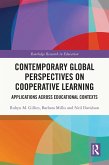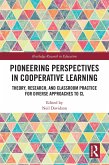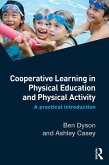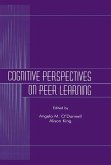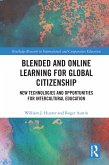Contemporary Global Perspectives on Cooperative Learning (eBook, ePUB)
Applications Across Educational Contexts
Redaktion: Gillies, Robyn M.; Davidson, Neil; Millis, Barbara
40,95 €
40,95 €
inkl. MwSt.
Sofort per Download lieferbar

20 °P sammeln
40,95 €
Als Download kaufen

40,95 €
inkl. MwSt.
Sofort per Download lieferbar

20 °P sammeln
Jetzt verschenken
Alle Infos zum eBook verschenken
40,95 €
inkl. MwSt.
Sofort per Download lieferbar
Alle Infos zum eBook verschenken

20 °P sammeln
Contemporary Global Perspectives on Cooperative Learning (eBook, ePUB)
Applications Across Educational Contexts
Redaktion: Gillies, Robyn M.; Davidson, Neil; Millis, Barbara
- Format: ePub
- Merkliste
- Auf die Merkliste
- Bewerten Bewerten
- Teilen
- Produkt teilen
- Produkterinnerung
- Produkterinnerung

Bitte loggen Sie sich zunächst in Ihr Kundenkonto ein oder registrieren Sie sich bei
bücher.de, um das eBook-Abo tolino select nutzen zu können.
Hier können Sie sich einloggen
Hier können Sie sich einloggen
Sie sind bereits eingeloggt. Klicken Sie auf 2. tolino select Abo, um fortzufahren.

Bitte loggen Sie sich zunächst in Ihr Kundenkonto ein oder registrieren Sie sich bei bücher.de, um das eBook-Abo tolino select nutzen zu können.
This volume captures contemporary global developments in cooperative learning (CL) across varied educational contexts, levels, and disciplines. It offers a wide-ranging perspective and addresses a range of cooperative learning pedagogies including relational, online, and peer learning, STAD, the Jigsaw model, and dialogic talk.
- Geräte: eReader
- ohne Kopierschutz
- eBook Hilfe
- Größe: 1.04MB
Andere Kunden interessierten sich auch für
![Contemporary Global Perspectives on Cooperative Learning (eBook, PDF) Contemporary Global Perspectives on Cooperative Learning (eBook, PDF)]() Contemporary Global Perspectives on Cooperative Learning (eBook, PDF)40,95 €
Contemporary Global Perspectives on Cooperative Learning (eBook, PDF)40,95 €![Pioneering Perspectives in Cooperative Learning (eBook, ePUB) Pioneering Perspectives in Cooperative Learning (eBook, ePUB)]() Pioneering Perspectives in Cooperative Learning (eBook, ePUB)40,95 €
Pioneering Perspectives in Cooperative Learning (eBook, ePUB)40,95 €![Cooperative Learning in Physical Education and Physical Activity (eBook, ePUB) Cooperative Learning in Physical Education and Physical Activity (eBook, ePUB)]() Ben DysonCooperative Learning in Physical Education and Physical Activity (eBook, ePUB)50,95 €
Ben DysonCooperative Learning in Physical Education and Physical Activity (eBook, ePUB)50,95 €![Cognitive Perspectives on Peer Learning (eBook, ePUB) Cognitive Perspectives on Peer Learning (eBook, ePUB)]() Cognitive Perspectives on Peer Learning (eBook, ePUB)56,95 €
Cognitive Perspectives on Peer Learning (eBook, ePUB)56,95 €![Blended and Online Learning for Global Citizenship (eBook, ePUB) Blended and Online Learning for Global Citizenship (eBook, ePUB)]() William HunterBlended and Online Learning for Global Citizenship (eBook, ePUB)40,95 €
William HunterBlended and Online Learning for Global Citizenship (eBook, ePUB)40,95 €![Integrating Racial Justice Into Your High-School Biology Classroom (eBook, ePUB) Integrating Racial Justice Into Your High-School Biology Classroom (eBook, ePUB)]() David UpeguiIntegrating Racial Justice Into Your High-School Biology Classroom (eBook, ePUB)33,95 €
David UpeguiIntegrating Racial Justice Into Your High-School Biology Classroom (eBook, ePUB)33,95 €![Cooperative Learning for Intercultural Classrooms (eBook, PDF) Cooperative Learning for Intercultural Classrooms (eBook, PDF)]() Kate Ferguson-PatrickCooperative Learning for Intercultural Classrooms (eBook, PDF)38,95 €
Kate Ferguson-PatrickCooperative Learning for Intercultural Classrooms (eBook, PDF)38,95 €-
-
-
This volume captures contemporary global developments in cooperative learning (CL) across varied educational contexts, levels, and disciplines. It offers a wide-ranging perspective and addresses a range of cooperative learning pedagogies including relational, online, and peer learning, STAD, the Jigsaw model, and dialogic talk.
Dieser Download kann aus rechtlichen Gründen nur mit Rechnungsadresse in A, B, BG, CY, CZ, D, DK, EW, E, FIN, F, GR, HR, H, IRL, I, LT, L, LR, M, NL, PL, P, R, S, SLO, SK ausgeliefert werden.
Produktdetails
- Produktdetails
- Verlag: Taylor & Francis eBooks
- Seitenzahl: 222
- Erscheinungstermin: 29. März 2023
- Englisch
- ISBN-13: 9781000857351
- Artikelnr.: 67428790
- Verlag: Taylor & Francis eBooks
- Seitenzahl: 222
- Erscheinungstermin: 29. März 2023
- Englisch
- ISBN-13: 9781000857351
- Artikelnr.: 67428790
- Herstellerkennzeichnung Die Herstellerinformationen sind derzeit nicht verfügbar.
Robyn M. Gillies is Professor of Education at The University of Queensland, Australia. Neil Davidson is Professor Emeritus of Education at the University of Maryland, USA. Barbara Millis is an Educational Consultant based in St. Antonio, Texas, USA.
Cooperative Learning and the State of the Field: An Introduction Section 1: Effectiveness, Benefits, and Limitations of Cooperative Learning (CL) 1. Can Cooperative Learning Enhance Student Thinking and Question Generation? 2. Can students learn by teaching their peers during cooperative learning? 3. Positive resource interdependence for young students: a nudge for cooperation but a pitfall for learning 4. "We all keep growing and learning" - Facilitating meaningful educational experiences through peer assisted learning across different educational levels in El Salvador Section 2: Achieving Equitable Learning through Cooperative Learning 5. Giving voice to diversity: Cooperative strategies for intercultural citizenship 6. Teacher perceptions of primary aged students' social capabilities in Australia, England and Sweden and their importance to inclusive classrooms 7. Individual Group Work Assessment in Cooperative Learning: Possibilities and Challenges 8. Syrian Refugee Teachers' Perceptions of STAD and Jigsaw Models in Classrooms of Underprivileged Learners in Lebanon 9. Think-Pair-Share and ThinkTrix: Standard Bearers of Student Dialogue 10. Cooperative Learning Through Philosophy for Children Around the World Section 3: Initiating and Deepening Cooperative Learning in Diverse Educational Contexts 11. Developing Reciprocal Peer Tutoring in Irish Medium Schools 12. Developing a Community of Practice for Teacher's Learning and Implementation of Cooperative Learning 13. Cooperative Learning in Japan as a Core Strategy Deepening Cooperation in Education Section 4: Cooperative Learning in Action 14. Promoting Dialogic Talk during Cooperative Learning 15. A shift to the future: The paradigmatic approach of cooperative learning in online practice 16. Group worthy cooperative learning structures in the college classroom 17. Cooperative Learning for Academic, Personal and Social Development in Higher Education in Africa 18. Cooperative Learning in Engineering Education: The Story of an Ongoing Uphill Climb
Cooperative Learning and the State of the Field: An Introduction Section 1: Effectiveness, Benefits, and Limitations of Cooperative Learning (CL) 1. Can Cooperative Learning Enhance Student Thinking and Question Generation? 2. Can students learn by teaching their peers during cooperative learning? 3. Positive resource interdependence for young students: a nudge for cooperation but a pitfall for learning 4. "We all keep growing and learning" - Facilitating meaningful educational experiences through peer assisted learning across different educational levels in El Salvador Section 2: Achieving Equitable Learning through Cooperative Learning 5. Giving voice to diversity: Cooperative strategies for intercultural citizenship 6. Teacher perceptions of primary aged students' social capabilities in Australia, England and Sweden and their importance to inclusive classrooms 7. Individual Group Work Assessment in Cooperative Learning: Possibilities and Challenges 8. Syrian Refugee Teachers' Perceptions of STAD and Jigsaw Models in Classrooms of Underprivileged Learners in Lebanon 9. Think-Pair-Share and ThinkTrix: Standard Bearers of Student Dialogue 10. Cooperative Learning Through Philosophy for Children Around the World Section 3: Initiating and Deepening Cooperative Learning in Diverse Educational Contexts 11. Developing Reciprocal Peer Tutoring in Irish Medium Schools 12. Developing a Community of Practice for Teacher's Learning and Implementation of Cooperative Learning 13. Cooperative Learning in Japan as a Core Strategy Deepening Cooperation in Education Section 4: Cooperative Learning in Action 14. Promoting Dialogic Talk during Cooperative Learning 15. A shift to the future: The paradigmatic approach of cooperative learning in online practice 16. Group worthy cooperative learning structures in the college classroom 17. Cooperative Learning for Academic, Personal and Social Development in Higher Education in Africa 18. Cooperative Learning in Engineering Education: The Story of an Ongoing Uphill Climb

